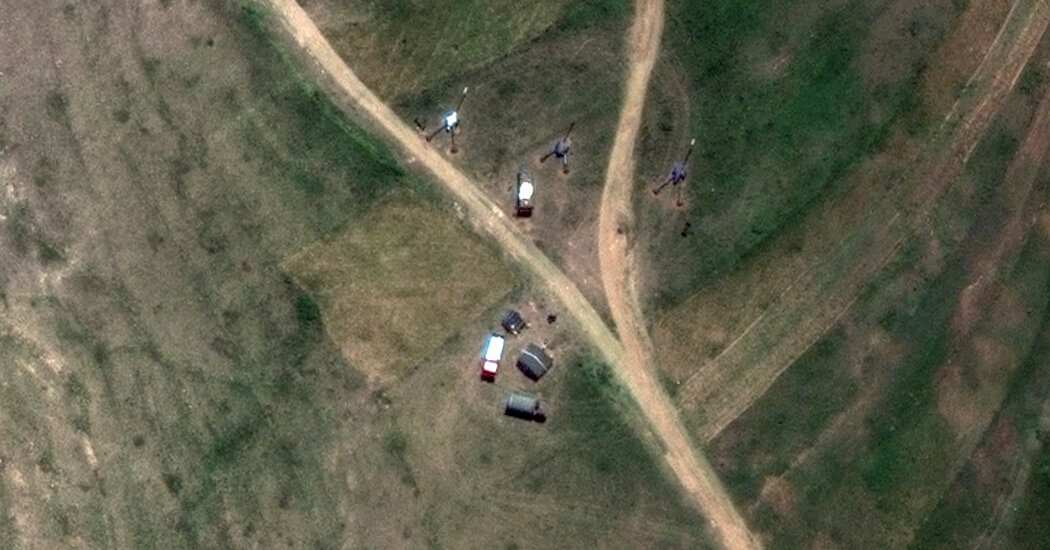
Slaughter on Eve of Ethiopian Peace Draws Accusations of War Crimes
Just before the peace agreement to end Ethiopia’s civil war, troops from neighboring Eritrea massacred hundreds of civilians, looted businesses and arbitrarily detained civilians already facing extraordinary suffering, according to rights groups, aid workers and news outlets.
The Eritrean soldiers were fighting on the side of the Ethiopian government, which was waging a two-year civil war against the leadership of the northern Tigray region.
The gruesome accounts underscore the ugly nature of a conflict that killed hundreds of thousands of people, displaced millions and upended life in Africa’s second most populous nation. The violence reached a climax last fall, after a five-month truce was shattered in August and before the beginning of the formal peace talks in South Africa in late October that led, within days, to the end of the war.
On Tuesday, The Washington Post reported that Eritrean forces killed hundreds of people, including teachers and farmers, at the very end of that period, just days before the warring parties agreed to end the hostilities. Relatives of those killed described horrific scenes, including parents being shot in front of their children.
Last month, Tigrayan officials reported a spate of killings late last year, including those of five young men who they said were shot by Eritrean forces and buried together in a village in eastern Tigray. Human Rights Watch also documented that civilians suffered from bombardments from Ethiopian and Eritrean forces as they launched major campaigns to capture strategic towns like Shire in October.
The U.S. has confirmed that Eritrean troops were in Ethiopia and remained so, even though the peace deal in November called for all foreign forces to withdraw from the Tigray region, and eyewitnesses in the region told The New York Times they had seen the troops. But Ethiopia has denied the presence of any security forces other than its own in the Tigray region. In a rare news conference, in February, President Afwerki dismissed his country’s involvement in human rights abuses in Tigray as a “fantasy.”
The reports of violence come more than two years after the Ethiopian government, led by its Nobel Peace Prize-winning prime minister, Abiy Ahmed, launched an assault against the Tigray People’s Liberation Front, or T.P.L.F., a one-time rebel movement that had dominated the country’s politics for nearly three decades. Even though Mr. Abiy promised a swift campaign, the violence dragged on for two years, undermining economic progress and eroding the hopes of young Ethiopians who had catapulted him to power in 2018.
As the war raged on, rights groups also accused the Tigrayan forces of carrying out human rights violations, including executing civilians and looting health facilities.
In October, the warring sides convened in Pretoria, South Africa, in a mediation process led by the African Union and bolstered by countries including the United States. Just 10 days later, the two sides agreed to end the war in a pact that handed a clear victory for Mr. Abiy and his government.
As part of the deal, Tigrayan leaders agreed to disarm their forces and allow federal troops to enter the regional capital of Mekelle and take over airports and other federal facilities. In return, the government promised to reconnect the region, which had no electricity, banking or internet services for the better part of two years.
Eritrea was not a party to the peace agreement, and regional observers have wondered if the country’s autocratic leader, Isaias Afwerki, would abide by it and pull his troops from the Tigray region.
“President Isaias is considered a sphinx even by his regional peers,” Alan Boswell, the Horn of Africa director at the International Crisis Group, said. “Trying to guess his next move has become something of a regional parlor game.”
During a visit to Kenya in January, the U.S. ambassador to the United Nations, Linda Thomas-Greenfield, said at a news conference that it was imperative for Eritrean troops to leave Ethiopia altogether “if this cease-fire is to hold and humanitarian assistance is allowed to continue to flow.”
In recent weeks, eyewitnesses and humanitarian officials have told The Times that Eritrean troops have been seen leaving several towns in Tigray and heading toward the Ethiopian-Eritrean border. In the town of Adwa, some of the soldiers attacked civilian homes, threatening people and taking their belongings including livestock, farm equipment and jerrycans full of cooking oil and water, according to a religious leader in the town, who spoke on the condition of anonymity for fear of retribution.
Eritrean forces were also seen leaving the towns of Axum and Shire between late January and early February while singing on top of trucks and firing in the air.
“They were chanting, ‘We are Eritrea,’” Kalayu Getachew, a resident of Shire, said in a telephone interview. He added, using a shorthand for Eritrean troops: “Their slogan was, ‘America only talks, T.P.L.F. brags and Shabia punishes.’”
An unpublished report by a group of humanitarian aid agencies that visited northwestern Tigray in late December also mentioned the presence of Eritrean forces in the region. The report, obtained by The Times, noted cases of arbitrary detentions, abductions, sexual violence, extrajudicial killings and looting against the civilian population in the area.
Ethiopia has also recently called for the termination of what it calls the “highly politicized” U.N.-backed International Commission of Human Rights Experts on Ethiopia, which is probing human rights violations during the war.
The latest revelations come even as Ethiopia faces multiple crises, including hunger, outbreaks of disease and ethnic massacres in other parts of the country.
Mekelle continues to be plagued by high unemployment and food prices and limited access to health care. Kinfe Hadush, a resident of Mekelle, said in a telephone interview that displaced and hungry people come knocking at his door almost every day.
“The sound of a bullet has stopped,” he said, “but the sound of starvation is still here.”
An employee of The New York Times contributed reporting from Addis Ababa, Ethiopia.
